With the world’s gazed fixed on Athens, a former academic with a penchant for leather jackets has taken centre stage. With no plan B and nothing to lose, he’s ready for battle — and if it all goes wrong, he says, he’ll just get back to his book
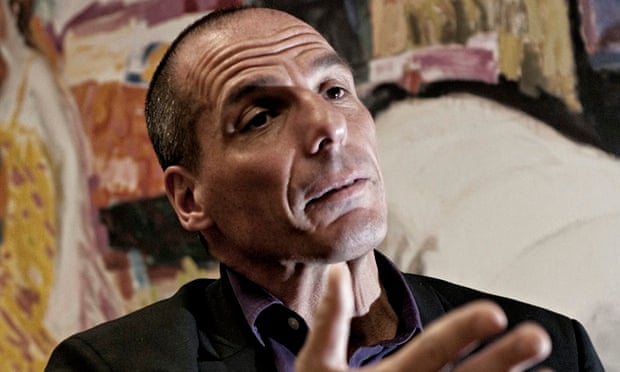
Yanis Varoufakis …’We’ve lost everything, so we can speak truth to power, and it’s about time we do.’ Photograph: Panagiotis Moschandreou
Yanis Varoufakis, it is fair to say, was barely known not that long ago. True, he was a bit of a celebrity in the arcane world of austerity economics. His vivid views, conveyed through blogs, books, tweets and talks, were the focus of some animation whenever Greece careered in and out of its seemingly endless debt crisis. In Athens, the town where he was born and bred, the economics professor enjoyed a cult following among austerity’s opponents in Syriza, the far-left party that recently surged to power.
When the crisis broke – and before he departed for the ivory towers of the University of Texas at Austin – he was a regular in the boisterous talk shows that dominate Greek television. But beyond that, Yanis Varoufakis was just … Yanis Varoufakis. In a wider arena, he was not a name to conjure with. So my first question when we meet in his office on the sixth floor of the finance ministry, which every finance minister has inhabited since Europe’s great Greek debt drama began, is: how does he feel? Is Yanis Varoufakis, the academic turned neophyte politician, entirely comfortable with his new star status?
After all, the bar has been raised rather high. In the space of three short weeks, he’s been christened Europe’s man of the moment, compared to heroes great and small, likened to a rock star, hailed as a sex icon, feted by fashionistas, and in Germany, no less, portrayed as the greatest action man to bestride planet earth since Bruce Willis set Hollywood alight in Die Hard 6. Few have had their demeanour and dress code so dissected; when he posed with George Osborne in Downing Street, his tieless, leather-jacketed look standing in stark contrast to the Chancellor’s, the press was as breathless as if a supermodel had blown in. “Britain,” declared no less venerable an authority than the Daily Telegraph, “is crying out for a politician who looks like Yanis Varoufakis.
It’s quite a change in lifestyle. Has it gone to his head? The response is immediate. “I can assure you, Helena, I did not engineer it in any way. I am not promoting it. They go on about me riding a bike, but I have been riding a bike since I was 15. I just am who I am.”
Who Varoufakis is, of course, is a dynamite question that those in high places may well be forgiven for asking. As the politician tasked with saving Greece in this, its most difficult hour, what the radical, shaven-haired economist thinks, how he comports himself and what he says are not without consequence. Linked as it is to that of the Eurozone, his country’s fate is intrinsically connected to the global economy. Is he fearful? “A bit,” he says. “If I weren’t scared, I’d be awfully dangerous.”
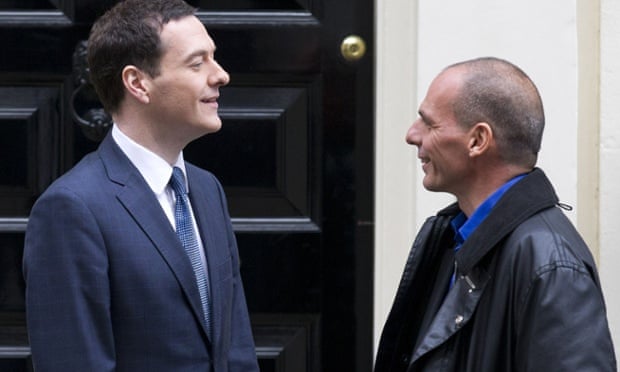
George Osborne and Yanis Varoufakis outside 11 Downing Street in London. Varoufakis’s relaxed look was in stark contrast to the British chancellor’s. Photograph: Justin Tallis/Getty
Varoufakis is muscular, fit, amiable, slightly off-centre, everything he seems on camera. But what film does not capture is his energy, focus and intensity. An hour in his company will take you places; in our case, from Marxist theory to the joys of jazz; the Eurozone and its incomplete architecture; sartorial tastes; Nazism; the bigness of America; austerity politics; debt traps; poetry; exercise and Varoufakis’ tendency to keep his hands in his pockets (the result of a shoulder injury).
The academic, who had a faithful following on the lecture circuit, despite being a self-described accidental economist, subscribes to the view that one should have an opinion about all and sundry. It is, he says, something he picked up long ago. “I was told, once, by a left-wing scholar that as a Marxist you have to do two things: always be optimistic and always have a view about everything. That advice still sounds good to me.”
At 53, Varoufakis is still clear that he “understands the world better” as a result of having read Marx. But he no longer considers himself a diehard leftie, whatever others may think. Rather, he says, he is a libertarian or erratic Marxist, who can marvel at the wondrousness of capitalism but is also painfully aware of its inherent contradictions, just as he is “the awful legacy” of the left. “It is a system that produces massive wealth and massive poverty,” proclaims the economist who taught at the universities of East Anglia, Cambridge, Glasgow and Sydney after gaining his doctoral degree at the University of Essex. “I don’t think you can understand capitalism until and unless you understand those contradictions and ask yourself if capitalism is the natural state. I don’t think it is. That’s why I am a left-winger.”
| Rolling coverage as finance minister Yanis Varoufakis meets Wolfgang Schäuble, after the ECB hits Greece with the news it will no longer accept its junk-rated debt as collateral Read more |
More than that, Varoufakis is an iconoclast, a self-styled “contrarian” who is also an idealist, “because if you are not an idealist, you are a cynic”. And he has, he laments, lost a lot of friends on the left who believe that
Grexit, Greece’s exit from the currency bloc, would be the country’s best course.
“It’s one thing to say you shouldn’t have gotten into the euro, it’s quite another to say you should get out of the euro. If we backtrack, we fall off a cliff. This is my argument to everyone.” Europe, he insists, is stuck with Greece because Athens is never going to ask to leave the euro. Fittingly, perhaps, the new MP, who has dual Greek-Australian citizenship, is not a signed-up member of Syriza, the party he now represents in the rambunctious Athens parliament. Syriza’s militant wing wants nothing more than to get out of the monetary union.
When we meet, Varoufakis has just got back from a whistle-stop tour that has taken him to London, Paris, Rome, Frankfurt, Brussels and Berlin. It is 10pm and he arrives at his office with a bottle of cola and chocolate bar in hand. The luggage of his close friend, the renowned economics professor Jamie Galbraith, who has flown in from Austin where Varoufakis has spent the past three years as a visiting professor, are spread across the room. It’s been a long day, one that started at 6am with a few weights and stretching in the gym.
“I don’t have much time,” he mutters before lurching into how his wife, the installation artist Danae Stratou, is still in Austin packing up the couple’s belongings. “You can’t imagine the pressure. It’s incredible.” Then he is off and hard to stop.
Varoufakis’ academic speciality, appropriately, is game theory. Galbraith, with whom he co-authored A Modest Proposal – a tract that proffered various ideas to end the euro crisis, has been quoted as saying that Varoufakis is so sharp he will “be thinking more than a few steps ahead” in negotiations with Athens’ creditors. The subtext is that his Eurozone colleagues will underestimate him at their peril. That Varoufakis is self-assured – and guided by the convert’s conviction that he is right – cannot be denied. Alone among finance ministers, he has his own Facebook page dedicated to supporters and called V for Varoufakis.
Without a hint of self-deprecation or doubt, he tells me early on that he is “moved by” an internationalist agenda and thus motivated by the concerns of Europe and the world. “I cannot possibly separate the fate of this country from the fate of Europe. For some reason, lots of terrible things start here and then spread. The cold war was one. It didn’t start in Berlin, it started in Athens in December 1944; the contagion in the Eurozone started here in 2010. We are perfectly capable as Europeans of messing things up unnecessarily.”
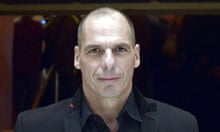 |
| The self-proclaimed ‘accidental economist’ is expected to adopt a constructive approach to tough debt negotiations Read more |
Little Greece will say it as it is: five years on, the medicine prescribed by
Germany, Europe’s paymaster, to mend the ills of run-away profligacy hasn’t worked. Instead, the nation has become an echo of its former self; its economy slashed by almost a third, one in four out of work, one in three facing the prospect of living in abject poverty.
“We’ve lost everything,” he says. “So we can speak truth to power, and it’s about time we do.”
As soon as he assumed office, he set about doing that. It was not business as usual, he declared, and Athens would not be liaising with the “rotten troika” of creditors at the EU, European Central Bank and International Monetary Fund that have monitored Greek finances since the country’s brush with bankruptcy in 2010. At that point many began to wonder whether Greece had lost it, and Varoufakis was pursuing what in game theory is known as the madman strategy. Act crazy and your enemy eventually gives you what you want. “I respect him, but do worry that he sees all this as a giant experiment to verify his theories,” sighs Kyriakos Mitsotakis, the minister of administrative reform in the former conservative-led government. “That’s all right for him. He’ll probably go on to get a job as a star economist. For the country, though, it would be a disaster.”
But coming face-to-face with the raw reality of governmental responsibility has also had a calming effect. Varoufakis, whose linguistic gymnastics have included phrases such as “fiscal waterboarding” – used to describe the devastating effects of austerity – has toned down his rhetoric. He’s not looking for a fight, he claims. He’s looking for justice. And justice does not mean Greece’s new left-dominated government signing a declaration that disavows its own critique of the rescue programme the country has been forced to implement so disastrously.
“We are a party of the left, but what we are putting on the table is essentially the agenda of a reformist bankruptcy lawyer from the City of London,” he says. “The bailout was not a bailout of Greece in 2010, it was a bailout of the German and French banks. The German public was misled into thinking that this was money going to the Greeks, the Greek public was misled into thinking that this was our salvation.”
But he also recognises that despite all the brinkmanship and posturing, the time has come to find face-saving solutions. Greece just needs “a little bit of time,” a bridging loan that would give it the fiscal space to devise the best plan possible for where to go next. Lenders can call that whatever they like. “If we were a corporation, wouldn’t it be logical at this point to have a review of our business plan?” he asks. “Lets find a face-saving phraseology, a face-saving [way out]. We are good in Europe at that. Euphemisms are our strength … alas, the answer is ‘no, there is a process and if you don’t sign on the dotted line, all hell will break lose.’”
Even by the standards of those who have occupied the sixth floor of the finance ministry before, Varoufakis’ tenure comes at an unusually onerous time. With the country’s €240bn bailout – the biggest in global history – set to expire at the end of February, and the Greek electorate having overwhelmingly rejected austerity, Greece is at a crossroads.
In a climate of high-octane pressure – though her language was more emollient, the German chancellor Angela Merkel showed little sign this week of giving in anytime soon – the possibility of political blunder, or accident, grows with each day. Athens owes some €25bn in repayments, this year alone, and what is certain is that it does not have that kind of money.
When I ask Varoufakis if he has a plan B, for all negotiators surely have a credible alternative, he looks at me wide-eyed. “We constantly hear, ‘if you don’t sign on the dotted line there is going to be Armageddon’. My answer is ‘let it happen!’ There is no fall-back plan. That is my plan B.”
What if it does happen, I ask, as images of the chaos bankruptcy would surely entail flicker across my mind. “Well, that is like asking me what happens if a comet strikes planet Earth. I have no idea. None!” he shoots back.
Varoufakis is the first to say that no one should grow too fond of power. He has no desire to be on the sixth floor of the finance ministry longer than necessary. He has dispensed with the policemen assigned to protect him, the army of advisers that come with the job (let go to make way for the rehiring of the ministry’s sacked women cleaners), and each of the three cars deployed to him. If he lost the job, he says, he wouldn’t mind. “When interlocutors threaten me with the fall of this government, because they do, I say: ‘Make my day,’” he smiles. “I mean, I really don’t want to be in this office … I will go back to my book about Europe, which is half-finished. It’s very difficult to find an ending when I am still in this job.”
A few days later I pass Varoufakis and Galbraith outside the ministry in Syntagma Square. It is late and both are walking in the pouring rain towards a taxi rank. I hear the Greek politician, rucksack on back, enthusing about the surge in his book sales. Despite it all, he is happy. And not very far from being the Yanis Varoufakis he always was.
Photo: An unverified video has appeared online purporting to show Islamic State shows fighters destroying museum exhibits dating back thousands of years. (Reuters)
Photo: One of Afghanistan's Bamiyan Buddhas in 1963 and then after its destruction, at the hands of the Taliban, in 2008. (UNESCO/A Lezine, Carl Montgomery)

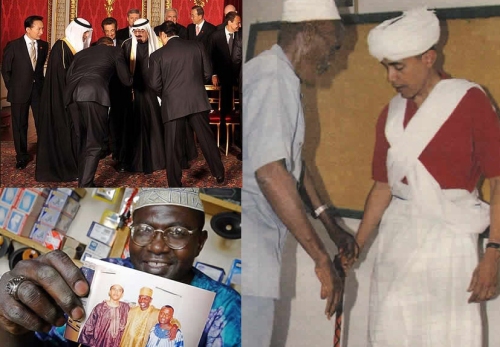







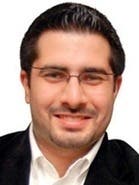
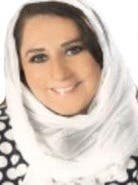



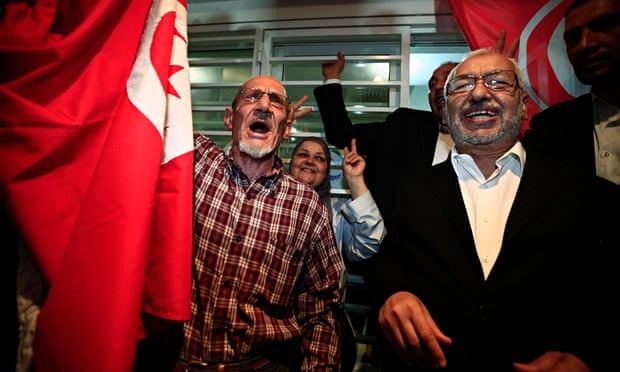








 The document outlines Libya's "geographic dimensions"
The document outlines Libya's "geographic dimensions" 

